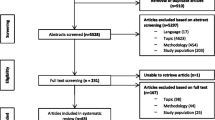Abstract
When families cannot serve as full-time caregivers for severely, mentally ill family members, agency-supported caregivers provide an alternative to chronic hospitalization. Caregivers who provide 24 hour per day care experience caregiver burden; they also find rewards and meaning in their work. The purpose of this study is to observe positive experiences of paid caregivers for seriously, mentally ill individuals, especially the meaning or purpose it gives their lives and the self-fulfilment or self-actualization that caregiving provides. The caregivers in this study possessed a high purpose in life suggesting that caregiving may give meaning to life. Also, the caregivers of these individuals with severe, mental illness tend to be highly other-oriented (altruistic), an external focus that may decrease their own self-awareness. Thus, caregivers who provide continuous residential care may benefit from therapeutic interventions designed to reinforce self-care skills.
Similar content being viewed by others
REFERENCES
Bowen, S., Anderson, H. N., & Holliman, W. B. (1987). Stress, illness, and the Personal Orientation Inventory. Journal of Human Behavior and Learning, 41, 55-60.
Corsini, R. J., & Wedding, D. (Eds.). (1989). Current psychotherapies (4th ed.). Itasca, IL: F. E. Peacock Publishers, Inc.
Crumbaugh, J. C. (1968). Cross-validation of Purpose-in-Life Test based on Frankl's concepts. Journal of Individual Psychology, 24, 74-81.
Crumbaugh, J. C., & Maholick, L. T. (1964). An experimental study in existentialism: The psychometric approach to Frankl's concept of noogenic neurosis. Journal of Clinical Psychology, 20, 200-207.
Crumbaugh, J. C., & Maholick, L. T. (1981). Manual of Instructions for the Purpose in Life Test. Murfreesboro, TN: Psychometric Affiliates.
Ebersole, P., & DePaola, S. (1989). Meaning in life depth in the active married elderly. Journal of Psychology, 123, 171-178.
Frankl, V. E. (1984). Man's search for meaning: An introduction to logotherapy (3rd ed.). New York: Simon & Schuster. Inc.
Frankl, V. E. (1986). The doctor and the soul: From psychoanalysis to existential analysis. New York: Random House.
Illardi, R. L., & May, W. T. (1968). A reliability study of Shostrom's Personal Orientation Inventory. Journal of Humanistic Psychology, 8, 68-72.
Knapp, R. R. (1990). POI Handbook (2nd ed.). San Diego: EdITS Publishers.
Malanowski, J. R., & Wood, P. H. (1984). Burnout and self-actualization in public school teachers. Journal of Psychology, 117, 23-26.
Maslow, A. H. (1968). Toward a psychology of being (2nd ed.). New York: Van Nostrand Reinhold Company, Inc.
Maslow, A. H. (1987). Motivation and personality (2nd ed.). (Revised by R. Frager, J. Fadiman, C. McReynolds, & R. Cox). New York: Harper & Row. (Original work published 1954).
O'Connor, K., & Chamberlain, K. (1996). Dimensions of life meaning: A qualitative investigation at mid-life. British Journal of Psychology, 87, 461-477.
Olczak, P. V., & Goldman, J. A. (1975). The relationship between self-actualization and psychosocial maturity. Journal of Clinical Psychology, 31, 415-419.
Rogers, C. R. (1956). Some issues concerning the control of human behavior (Symposium with B. F. Skinner). Science, 124, 1057-1066.
Shostrom, E. L. (1964). An inventory for the measurement of self-actualization. Educational and Psychological Measurement, 24, 207-218.
Shostrom, E. L. (1974). Manual for the personal orientation inventory (POI). San Diego: EDITS/ Educational and Industrial Testing Service.
Shostrom, E. L., Knapp, L. F., & Knapp, R. R. (1976). Actualizing therapy: Foundations for a scientific ethic. San Diego: EdITS.
Tloczynski, J., Knoll, C., & Fitch, A. (1997). The relationship among spirituality, religious ideology, and personality. Journal of Psychology and Theology, 25, 208-213.
Author information
Authors and Affiliations
Rights and permissions
About this article
Cite this article
Rhoades, D.R., McFarland, K.F. Purpose in Life and Self-Actualization in Agency-Supported Caregivers. Community Ment Health J 36, 513–521 (2000). https://doi.org/10.1023/A:1001915831177
Issue Date:
DOI: https://doi.org/10.1023/A:1001915831177




